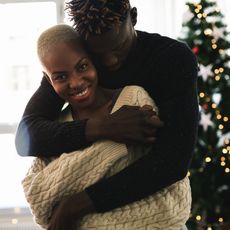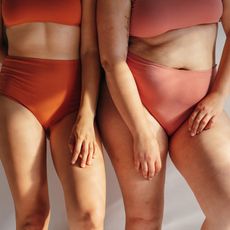One Woman Describes Sex After Sexual Assault


After a year of belated but necessary reckoning, it’s all the more clear how prevalent and deeply life-altering a sexual trauma can be. Harassment and assault happen in mere moments, and what’s left behind is anguish and fear that continue to permeate your body, shapeshifting from numbness to pain throughout your life. But how do we rebuild ourselves? That question doesn’t have a quick fix or an easy answer. There’s no cheat sheet to trauma. Each person is different and unique in their healing— and in their journey to locate confidence and comfort in sex after sexual assault. Below, Maeve Sheridan, a 21-year-old student, shares her story. Ed. note: This story shares details about sexual assault that might be triggering to some.
“My story starts the night of January 28, 2016. It’s a night I will never forget and one that haunts me to this day. I was 18 at the time, just about to turn 19, and four months into my freshman year of college at DePaul University in Chicago. I had been texting a guy I barely knew named Adam, and he had expressed he was into me a few times at parties. I wasn’t really interested in a physical relationship with him, but I was enjoying my newfound sense of freedom and flirting with him. I’m going to be completely transparent because I blamed myself for a long time after my assault, but now I am able to feel comfortable with the idea that my actions prior did not give him consent to do what he did.
“I was already tipsy, bordering on drunk, when Adam first texted me. I wish I could go back and read our messages for accuracy, but I remember a few exchanges in which I agreed to come over to his room. I went to his room, my legs and arms swinging loosely and inwardly giggling at myself for my tipsiness. I sat down in Adam’s room, and as we talked, I began to realize how drunk I was. My head was pounding, and the room was doing that thing that it does when you’re too drunk: tipping side to side, seemingly unable to stay still. This section of the night is spotty. I remember telling Adam before anything had happened that I didn’t want to have sex with him—this is one of the clearest memories I have and something I will never forget. I can feel my tongue pronouncing those words almost as clearly as I can see Adam saying ‘that’s totally fine.’ The next thing I remember was opening my eyes and feeling his mouth on me, feeling the scratch of his comforter on my bare back. I didn’t want it to happen, but I felt like my brain was filled with cotton or like the parts of my brain that led to my mouth were not working correctly. I finally managed to get the words ‘no, stop’ out, and I struggled to lean up and push him away from me. Then everything went black again.
“Once I realized what was going on, I pulled away and jumped to the end of the bed, grasping at his comforter to try to cover myself, immediately bursting into tears. ‘I said I didn’t want to have sex,’ I cried, unable to look him in the eyes.
“The week of Valentine’s Day was my breaking point when I realized I needed to take action against Adam. I had been starting to spiral into my emotions, drinking far too much and hooking up with any guy I could find, hoping to force my body into loving intimacy and sex again. Just four months later, I would experience my second sexual assault—this time in the comfort of my own apartment.
“I had to learn and accept my everyday life after the assaults would always be different than before. There was no way to ‘go back to normal.’ My life was irrevocably changed by both boys' actions. Everything I did before the assaults was the same after but with just the added weight of what had been done to me. It wasn’t physically obvious, but every action required double the strength for a long time.
“I am a very vocal person; I process my feelings out loud with trusted family and friends, but this was perhaps the first time in my life when I couldn’t talk about it because I couldn’t even explain the logic behind what was happening in my brain. I couldn’t bear the thought of breaking my parents’ hearts even more by telling them that I thought both times were my own fault or even that the second time happened, so I just kept it to myself. For almost a year, I let it simmer and burn a hole inside of me, attempting to self-medicate with alcohol and drugs and crappy, uncaring guys. I only truly began to heal when I started speaking up.
“I am a survivor of sexual assault, and it is nothing to be ashamed of. I can only heal by acknowledging this and sharing it with those who love and care for me.
“I definitely overcompensated for a long time in an attempt to feel like a sexy person and love my body again after the assaults. I yearned for outside approval of my body as more than just a sexual object, constantly looking for a man or woman to affirm my beauty and sexiness for me because the only thing I could see when I looked in the mirror was a tainted, broken body I didn’t recognize as my own.
“With the help of my therapist and consistent self-care (which included a three-month-long celibacy pact to myself), I started to feel sexy and beautiful again when I saw myself. I allowed myself to be alone and not rely on physical intimacy with others to dictate my self-confidence. It’s a constant struggle to this day, but I remind myself every time I look in the mirror that I am beautiful, and although I may have some cracks, I am certainly not broken.
“Although there is no part of me that is even remotely happy about what was done to me, I am so proud of my strength and the accomplishments that have followed. I think I am more myself now than ever before. These awful, unfair things that happened have forced me to become a more caring, empathetic person, and I have learned so much about myself since then. There is strength in vulnerability, and I will forever be a force of nature in my own twisted way. I love myself and will not pretend that every step of this journey has been easy (or ever will be), nor will I assert that my trauma is more or less important than those around me, but I wake up and survive every single day, and that is what I will continue to do. I will spread my knowledge of survival to those who need it and have dedicated my life to doing everything I can to prevent this from happening over and over again, as it does every day. Through my work after college, I want to pass the mic to survivors who don’t often get the chance to share their stories, like women of color, transgender women and men, and LGBTQ+ folks, all of whom should be heard, believed, and supported.
“I am only 21, so dating is already hard enough. My age group is plagued by boys with commitment issues and low emotional maturity, as we all know, so I struggle to find someone to be intimate with who understands the intensity of my past. I have a hard time trusting, and for the first year, often had flashbacks during sex about the assaults, which was an awkward and traumatizing experience. I’ve found that being up-front with my sexual partner is the most important thing. If they’re scared off by the fact that I wear my survivorship proudly on my shirt, then they’re definitely not the right person for me.”
If you have experienced sexual assault or harassment and are seeking support, guidance, or more information, the resources below are a great place to start:
National Sexual Assault Hotline
National Sexual Violence Resource Center
Disclaimer
This article is provided for informational purposes only and is not intended to be used in the place of advice of your physician or other medical professionals. You should always consult with your doctor or healthcare provider first with any health-related questions.
-
 This All-Natural Way to Relieve Period Cramps Is a Total Game Changer
This All-Natural Way to Relieve Period Cramps Is a Total Game ChangerGive it a try.
By Sarah Yang
-
 20 Holiday Gifts That Are on the Spicier Side
20 Holiday Gifts That Are on the Spicier SideFor your partner (or yourself).
By Sarah Yang
-
 I've Worn Period Panties for Years—Here's My Guide to the Best on the Internet
I've Worn Period Panties for Years—Here's My Guide to the Best on the InternetThey'll make that time of the month way better.
By Sarah Yang
-
 12 Signs Your Estrogen Levels Are Low—And What to Do About It
12 Signs Your Estrogen Levels Are Low—And What to Do About ItIt can seriously affect your health.
By Sarah Yang
-
 Here's Why Your Periods Can Make You Feel So Constipated
Here's Why Your Periods Can Make You Feel So ConstipatedPlus, how to make it better.
By Sarah Yang
-
 The 21 Best Sexual Wellness Products to Make Your Sex Life Better
The 21 Best Sexual Wellness Products to Make Your Sex Life BetterTake charge.
By Sarah Yang
-
 Here's How to Navigate Your Sex Life in Quarantine, According to the Experts
Here's How to Navigate Your Sex Life in Quarantine, According to the ExpertsWhether you're single or in a relationship.
By Sarah Yang
-
 Cara Delevingne Wants You to Embrace Your Sexuality
Cara Delevingne Wants You to Embrace Your SexualityInside the actress and model's latest venture.
By Sarah Yang

